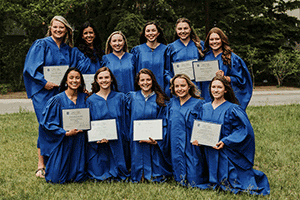Ready to learn more?
Get all the details straight to your inbox!

Luther College is a great choice for high school to university transition. Enjoy all the benefits of a larger campus, without feeling lost in the crowd. Our community is full of caring mentors and peers to ensure a positive student experience.

Luther College students are U of R students and receive all the same benefits. Upon graduation you will receive a U of R degree.

Every degree program at Luther College offers a study abroad option and an optional experiential learning component where you gain real world experience and get paid while going to school!

Luther College offers Bundles programs that group together first-year students and classes to give you a great start and help ease the transition from high school to university.

Living in The Student Village at Luther College, our student residence, comes with a choice of healthy, nutritious meal plans. That means no grocery shopping, no meals to cook, and no dirty dishes to worry about. You can focus on your studies and wellness!

Luther College students are eligible for nearly $100,000 in academic awards – in addition to scholarships and bursaries awarded by the U of R.

Luther students can register in Arts, Science, or Media, Art, and Performance. Luther students are U of R students and receive a U of R degree.

Luther College is recognized for its high standards of teaching, focused research, and one-on-one academic advising. We value and protect this heritage of excellence in scholarship, freedom of inquiry, and faithful seeking after truth.
Get all the details straight to your inbox!
By William A Stahl
What is the purpose of a university education? Corporate oligarchs and their apologists in the media are increasingly vocal about what they want from higher education. According to corporate CEO Gwyn Morgan: “the primary mission of universities is to provide the skills and knowledge needed to gain employment and become productive members of society….” (3 October 2010). The corporations need well-trained technicians to staff their bureaucracies and skilled engineers and scientists to invent new processes and products. They call for universities to be “accountable” to their “customers” (students) and deliver program in business and engineering. In this vision, the liberal arts are a luxury, a nice frivolity that the public cannot afford. As Morgan continues, “That a liberal arts education is a personally enhancing experience is not in dispute. But taxpayer financed tuition subsidies should focus on turning out graduates in fields that will enhance our country’s future prosperity” (24 April 2011).
Many within the university agree with this vision. Both on and off campus, the university is seen as an enormous job-training facility. Certainly the bulk our students come here to be certified for the job market and regard anything else as a waste of their time and money. A lot of administrators concur. For example, the University of Regina offers a guarantee of a job upon graduation (for “qualifying” students, of course). Students are seen as customers buying credits with their tuition dollars, faculty as suppliers who must compete for those dollars by providing customer satisfaction. The corporate model puts administrators under relentless pressure to maximize revenue and reduce costs. And when the inevitable budget cuts come, it is the liberal arts that are sacrificed.
There are two problems with the corporate model of the university. First, it is an inadequate model of education. This philosophy sees education as the transmission of skills and information, which puts emphasis upon learning “the facts” and formal logic. Its goal is training. That is why, for example, so much emphasis is placed upon technology in education, since computers can deliver information more cheaply than can highly-paid professors. One idea along these lines is to replace classroom instructors with on-line “master teachers” over the Internet (cf. Morgan, 3 October 2010). But, as Martha Nussbaum argues, “a catalogue of facts, without the ability to assess them, or to understand how a narrative is assembled from evidence, is almost as bad as ignorance, since the pupil will not be able to distinguish ignorant stereotypes from the truth, or bogus claims from valid ones” (2010, 94). This is education designed to produce drones—people with enough technical training to staff the corporations but without the vision or critical skills that might challenge the status quo.
The other problem with the corporate model of education is that while it subordinates everything to economics, ironically it has an inadequate understanding of the economy. In the corporate model the market is everything, indeed, it is the only thing. The corporatist ideology has been been dominant in North America for the past 30 years, but even in purely economic terms it has failed. We have been bubbles rather than sustainable growth, disparity in wealth unseen since the Gilded Age, exploding public and private debt, serious underinvestment in infrastructure, and, since the crash of 2008, chronic unemployment and economic instability. The corporatist ideology glorifies individual success, but ignores the common good which is the basis for community. As Robert Bellah and his associates wrote:
Economic ideology that turns human beings into relentless market maximizers undermines commitments to family, to church, to neighbourhood, to school, and to the larger national and global societies.… But the final irony is that this apparently economic conception of human life turns out to be profoundly destructive to our economy itself. If thinking of ourselves as members of a community made us poorer, there would still be many reasons to advocate it; but the fact is that commitment to a community turns out to be a much stronger basis for an effective economy than the individualistic pursuit of self-interest. (1991, 94)
Without community, without a strong sense of the common good, the foundation of the economy itself will be gradually eroded away until the whole edifice collapses. The ongoing economic crisis since 2008 has shown Bellah to be prescient.
An alternative to the corporatist model is the liberal arts. At the heart of the liberal arts is what, in social science language, is called agency. Agency is the capacity to act in the world, the freedom to make choices, and the ability to effect change and serve others. To be an agent is to be free. Two aspects of this are central to this discussion—citizenship and vocation.
Corporatist ideology prattles endlessly about “freedom,” but it has a truncated and circumscribed understanding of freedom. They offer the freedom of the consumer, where being “free” means to being able to passively choose between options offered by another. By contrast, agency is an active and responsible freedom, the freedom of the citizen. According to the Enlightenment philosopher Montesquieu, the central characteristic of the citizen is virtue, the willingness and ability to put the common good ahead of self-interest. Traditionally the liberal arts have been the school of virtue. Before the invention of the research university in the late 19th century, the typical capstone of a liberal education would be a class on moral philosophy taught by the college president. Over the last century, however, this has faded away. Today liberal arts faculty are more likely to espouse fashionable relativism and ironic distancing than the virtue and commitment of the citizen. But the ideal of the citizen is still embedded in the liberal arts and remains to be recovered.
In corporatist ideology, education is all about being trained for the job market and increasing productivity. By contrast, the liberal arts have traditionally been concerned with vocation. Vocation means more than a job, or even more than a career, but rather a calling. In this understanding of calling, according to Bellah, “work constitutes a practical ideal of activity and character that makes a person’s work morally inseparable from his or her life. It subsumes the self into a community of disciplined practice and sound judgement whose activity has meaning and value in itself, not just in the output or profit that results from it” (1985, 66). This means that a liberal arts education is always practical, but practical in a moral rather than a purely utilitarian sense. As with citizenship, discussion of vocation and calling has also faded from contemporary discourse in the liberal arts, but it too is intrinsic and remains to be recovered.
Decades ago we collectively took a wrong turn. We allowed hegemony to a corporate ideology which has now failed, even on its own terms. Revitalizing and rebuilding the understanding of citizenship and vocation embedded in the liberal arts provides hope for reconstruction.
References
Bellah, Robert, Richard Madsen, William Sullivan, Ann Swidler & Steven Tipton, 1985, Habits of the Heart, Berkeley: University of California Press.
Bellah, Robert, Richard Madsen, William Sullivan, Ann Swidler & Steven Tipton, 1991, The Good Society, New York: Alfred A. Knopf.
Nussbaum, Martha, 2010, Not for Profit, Princeton: Princeton University Press.
Montesquieu, 1949, The Spirit of the Laws, New York: Hafner Publishing Company, first published 1748.
Morgan. Gwyn, 3 October 2010, “If universities were in business, they’d be out of business,” The Globe and Mail, http://www.theglobeandmail.com/report-on-business/commentary/gwyn-morgan....
Morgan. Gwyn, 24 April 2011, “A passport to learning, but not to the job market,” The Globe and Mail, http://www.theglobeandmail.com/report-on-business/commentary/gwyn-morgan....